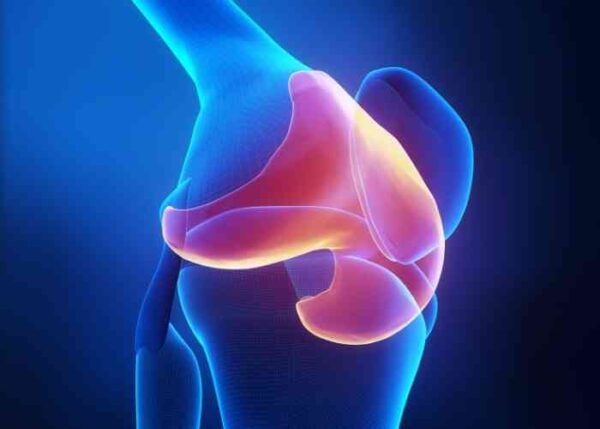Knee Cartilage Injury Specialist

Are you an athlete who participates in contact sports? If so, you may be at risk of sustaining a knee cartilage injury. Cartilage injuries are often caused by trauma, contact sports, repetitive weight bearing, and age related degeneration. Knee cartilage injury specialist, Dr. Matthew Provencher provides diagnosis and both surgical and nonsurgical treatment options for patients in Vail who have sustained a knee cartilage injury. Contact Dr. Provencher’s team today!
What is Knee Cartilage?
Cartilage is found throughout the human body and lines the joints’ surfaces. The connective tissue is less rigid than bone but is stiff enough to help absorb stress when placed on the joint. Cartilage provides a smooth protective layer within the knee joint, covering the tibia (shinbone), femur (thighbone) and the undersurface of the patella (kneecap). When a patient experiences a knee cartilage injury from trauma, overuse, a sports injury or natural degeneration from aging, they often feel chronic knee joint pain and swelling. Patients living in the Vail, Aspen, Colorado Springs and Denver, Colorado area suffering from a cartilage injury in the knee can depend on Dr. Matthew Provencher, knee specialist, to treat the injury and to return them to their daily activities and active lifestyles.
A knee cartilage injury can range from mild softening of the connective tissue to torn cartilage displaying underlying bone. Patients may also experience “loose bodies” floating within the knee joint. The term loose bodies refers to cartilage that has become separated from the bone during a traumatic event or age related degeneration and now floats unattached within the joint. Loose bodies have the potential to cause troublesome mechanical issues, such as catching and locking. In addition, cartilage damage can cause continued swelling, pain and limitation of motion and prevents the knee from full function.
What are Symptoms of a Knee Cartilage Injury?
The hallmark symptoms of a cartilage injury are constant, dull knee joint pain and swelling. Patients with loose bodies may also experience mechanical symptoms, including joint locking and catching.
How to Know if You have Damage to Knee Cartilage
Dr. Provencher will perform a thorough medical review and physical examination of the affected knee to reach a concrete diagnosis of a knee cartilage injury. Symptoms, such as knee joint pain, associated with a cartilage injury often mimic or overlap other joint injuries. Because of this, Dr. Provencher typically performs a series of x-rays and an MRI scan to rule out other knee injuries and to confirm the diagnosis.

What are Treatment Options for Knee Cartilage Damage?
It is critical patients undergo treatment for a knee cartilage injury since cartilage lacks its own blood supply and cannot heal naturally on its own. If left untreated, the injury may cause a patient to experience additional degeneration, leading to painful arthritis or other degenerative condition.
Does Knee Cartilage Damage Require Surgery?
Many cases of a knee cartilage injury are treated in a non-surgical manner with rest, ice, compression and elevation, otherwise known as the RICE method. Dr. Provencher may also prescribe anti-inflammatory medications (NSAIDs) and a physical therapy program to decrease pain and inflammation and to strengthen the affected joint. It is strongly suggested that patients work with the in-house physical therapists at Howard Head Sports Medicine to optimize their rehabilitation.
What are Surgical Treatment Options for Knee Cartilage?
A surgical procedure to treat chronic knee joint pain associated with a cartilage injury may be prescribed by Dr. Provencher if non-surgical measures fail or if the injury is too severe. Dr. Provencher utilizes a variety of arthroscopic techniques, including:
- Debridement (shaving) – Debridement is used to smooth the shredded or frayed cartilage, leading to decreased friction and irritation, reducing the symptoms of swelling and knee joint pain.
- Partial Menisectomy – A partial menisectomy is used when a portion of the torn meniscus needs to be repaired or removed to eliminate mechanical issues such as catching and locking.
- Microfracture (marrow stimulation) – Microfracture is used to treat damaged areas of articular cartilage in the knee by creating small holes in the bone to allow for blood flow, stimulating healing and neocartilage formation.
- Allograft transfer – Allograft transfer is used to replace the damaged areas with a cartilage-bone unit that is procured from a donor. This is usually reserved for large areas of cartilage damage and can be ideal in situations where the underlying bone is damaged.
- Autologous Chondrocyte Implantation (ACI) – ACI involves removing a small piece of cartilage and sending to a laboratory where additional cartilage cells are fostered from the sample. After a waiting period, the new cartilage cells are implanted by injecting the cartilage cells into the defect. These cells eventually grow into new, healthy cartilage.
- 3rd and 4th generation cartilage techniques – Dr. Provencher specializes in fresh cartilage transplantation that are augmented with biologics for optimal healing.
If you are experiencing chronic knee joint pain and swelling associated with a knee cartilage injury, please contact Dr. Matthew Provencher, orthopedic knee specialist serving patients in the Vail, Aspen, Colorado Springs and Denver, Colorado area.